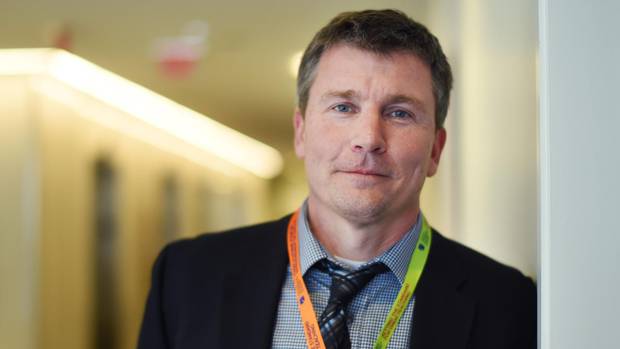An Ontario high-school science teacher is facing charges of professional misconduct for telling students they could die if they got vaccinated, and also for suggesting public health nurses were withholding information from teenagers about the side effects.
Timothy Sullivan, a teacher in Waterford, Ont., told a three-member independent panel of the Ontario College of Teachers on Tuesday that he did nothing wrong by informing his students of the negative side effects of vaccines. He said he was concerned students were not being properly told about the extent of the side effects and were still required to give informed consent for the vaccines to be administered.
But a lawyer for the college said Mr. Sullivan showed a pattern of behaviour that indicated he was “fixated on the issue of vaccines” and was inappropriate and disruptive at the school.
Christine Wadsworth told the hearing Mr. Sullivan is entitled to his opinions on vaccines, even if they are controversial, but “a line must be drawn” when it affects his ability to do his job professionally.
“Mr. Sullivan’s conduct and comments to both the public-health nurses and students were inappropriate,” Ms. Wadsworth said. “He tried to tell the students not to get the vaccine … and that they could die if they did.”
In recent years, a small number of parents have been vocal about their opposition to vaccines, saying they contain dangerous chemicals and that childhood illnesses are not as harmful as public-health officials make them out to be. Many of these beliefs are based on conspiracy theories and are rooted in scientific ignorance. The risk of complications, including death, from vaccines is low.
Ontario requires students to provide proof of immunization to attend school. Parents can get exemptions for their children on medical grounds, such as an allergy or a weakened immune system, or if they fill out a form stating they object to immunization.
Mr. Sullivan told reporters he was not against vaccines. He has been teaching for 17 years for the Grand Erie District School Board in Southwestern Ontario.
“I’m not an anti-vaxxer,” he said. “I’m pro-informed consent, pro-science, pro-asking questions.”
The incident occurred in March, 2015, when public health nurses were at Mr. Sullivan’s school to run an immunization clinic in the cafeteria.
Angela Swick, a public-health nurse in the Haldimand-Norfolk Health Unit, told the hearing she and three other nurses were administering four types of vaccines at the clinic that morning.
She said Mr. Sullivan came by the clinic on three separate occasions. She said he questioned the contents of the vaccine and told her some of the components in the vaccines were deemed “toxic” in his science lab. Ms. Swick said the teacher’s demeanour left her uncomfortable and nervous, and she contacted her supervisor and the school principal. One set of doors to the cafeteria was subsequently locked.
At one point, Ms. Swick said, Mr. Sullivan asked students in line if they knew what was in the vaccines and “shouted at them not to get it.” She said the situation at the school was “unsafe” for both students and the public-health nurses.
“We felt very intimidated and scared. We’ve just never had an encounter like this before,” Ms. Swick said. “We were pretty shaken up that day.”
Brian Quistberg, who was the school’s principal at the time, the hearing that it was “outside [Mr. Sullivan’s] role” to speak with students waiting for vaccinations, and the teacher had no reason to be at the clinic.
In cross-examining Ms. Swick, Mr. Sullivan asked the public-health nurse if she informed students about the risk from vaccines of death and the rare neurological condition Guillane-Barré syndrome.
Ms. Swick told the hearing that Public Health tells students and their parents about the most common risks, such as a fever or a sore arm. But she added that a screening tool allows nurses to assess if there are any underlying conditions that would trigger a more serious reaction among students.
The risk of death from receiving a vaccine, Ms. Swick said, is “so very, very rare.”
Mr. Sullivan was suspended from his job without pay for one day in 2015 after the incident.
If he is found guilty of professional misconduct, a discipline committee can impose a penalties that range from suspending his teaching certificate for up to two years to fining him as much as $5,000.
The hearing is scheduled to last two days.
The name of Mr. Sullivan’s school is covered by a publication ban to protect the identity of the students.
CAROLINE ALPHONSO – EDUCATION REPORTER
The Globe and Mail
Published Tuesday, Feb. 21, 2017 10:53AM EST
Last updated Wednesday, Feb. 22, 2017 8:19AM EST

